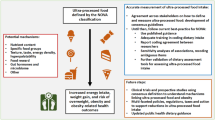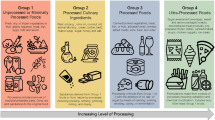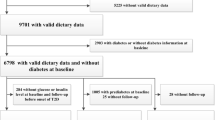Abstract
Oxidization of low-density lipoprotein (LDL) particles leads to formation of atherosclerotic lesions and increased risk of cardiovascular disease (CVD) via a complex cascade of biochemical events occurring mostly within the arterial wall. Multiple dietary factors impact LDL oxidation levels, such as fat-rich meals, hyper- and hypocaloric diets, and specific nutrients (vitamins E, C, and beta-carotene; mono- and polyunsaturated fatty acids; and polyphenolic compounds). These basic nutrients are naturally present at high concentrations, individually or in combinations, in common foods (fruits/vegetables, vegetable oils, red wine, soy, fish, tea); in turn, these foods are the main components of well-defined diets (Mediterranean, East Asian, balanced vegetarian) that display protective action against LDL oxidation and potentially against CVD. For most nutrients, however, both positive and negative evidence exists as to the extent of their antioxidant properties and protection against risk of CVD, prompting caution in the interpretation of data reports and health claims of advertised antioxidant products.
Similar content being viewed by others
References and Recommended Reading
Kaliora AC, Dedoussis GV, Schmidt H: Dietary antioxidants in preventing atherogenesis. Atherosclerosis 2006, 187:1–17.
Itabe H, Yamamoto H, Imanaka T, et al.: Sensitive detection of oxidatively modified low density lipoprotein using a monoclonal antibody. J Lipid Res 1996, 37:45–53.
Nishi K, Itabe H, Uno M, et al.: Oxidized LDL in carotid plaques and plasma associates with plaque instability. Arterioscler Thromb Vasc Biol 2002, 22:1649–1654.
Meisinger C, Baumert J, Khuseyinova N, et al.: Plasma oxidized low-density lipoprotein, a strong predictor for acute coronary heart disease events in apparently healthy, middle-aged men from the general population. Circulation 2005, 112:651–657.
Suzuki T, Kohno H, Hasegawa A, et al.: Diagnostic implications of circulating oxidized low density lipoprotein levels as a biochemical risk marker of coronary artery disease. Clin Biochem 2002, 35:347–353.
Toshima S, Hasegawa A, Kurabayashi M, et al.: Circulating oxidized low density lipoprotein levels. a biochemical risk marker for coronary heart disease. Arterioscler Thromb Vasc Biol 2000, 20:2243–2247.
Pedersen H, Petersen M, Major-Pedersen A, et al.: Influence of fish oil supplementation on in vivo and in vitro oxidation resistance of low-density lipoprotein in type 2 diabetes. Eur J Clin Nutr 2003, 57:713–720.
Holvoet P, Vanhaecke J, Janssens S, et al.: Oxidized LDL and malondialdehyde-modified ldl in patients with acute coronary syndromes and stable coronary artery disease. Circulation 1998, 98:1487–1494.
Lapointe A, Couillard C, Lemieux S: Effects of dietary factors on oxidation of low-density lipoprotein particles. J Nutr Biochem 2006, In press.
Folmer V, Soares JC, Gabriel D, et al.: A high fat diet inhibits delta-aminolevulinate dehydratase and increases lipid peroxidation in mice (Mus musculus). J Nutr 2003, 133:2165–2170.
Lu G, Greene EL, Nagai T, et al.: Reactive oxygen species are critical in the oleic acid-mediated mitogenic signaling pathway in vascular smooth muscle cells. Hypertension 1998, 32:1003–1010.
McPhail LC, Clayton CC, Snyderman R: A potential second messenger role for unsaturated fatty acids: activation of Ca2+-dependent protein kinase. Science 1984, 224:622–625.
Jula A, Marniemi J, Huupponen R, et al.: Effects of diet and simvastatin on serum lipids, insulin, and antioxidants in hypercholesterolemic men: a randomized controlled trial. JAMA 2002, 287:598–605.
Lopes HF, Morrow JD, Stojiljkovic MP, et al.: Acute hyperlipidemia increases oxidative stress more in african americans than in white americans. Am J Hypertens 2003, 16(5 Pt 1):331–336.
Stojiljkovic MP, Lopes HF, Zhang D, et al.: Increasing plasma fatty acids elevates f2-isoprostanes in humans: implications for the cardiovascular risk factor cluster. J Hypertens 2002, 20:1215–1221.
Morrow JD: Is oxidant stress a connection between obesity and atherosclerosis? Arterioscler Thromb Vasc Biol 2003, 23:368–370.
Suzuki K, Ito Y, Ochiai J, et al.: Relationship between obesity and serum markers of oxidative stress and inflammation in Japanese. Asian Pac J Cancer Prev 2003, 4:259–266.
Block G, Dietrich M, Norkus EP, et al.: Factors associated with oxidative stress in human populations. Am J Epidemiol 2002, 156:274–285.
Trevisan M, Browne R, Ram M, et al.: Correlates of markers of oxidative status in the general population. Am J Epidemiol 2001, 154:348–356.
Simoneau JA, Veerkamp JH, Turcotte LP, et al.: Markers of capacity to utilize fatty acids in human skeletal muscle: relation to insulin resistance and obesity and effects of weight loss. FASEB J 1999, 13:2051–2060.
Redon J, Oliva MR, Tormos C, et al.: Antioxidant activities and oxidative stress byproducts in human hypertension. Hypertension 2003, 41:1096–1101.
Keaney JF Jr, Larson MG, Vasan RS, et al.: Obesity and systemic oxidative stress: clinical correlates of oxidative stress in the framingham study. Arterioscler Thromb Vasc Biol 2003, 23:343–439.
Chan JC, Cheung JC, Stehouwer CD, et al.: The central roles of obesity-associated dyslipidaemia, endothelial activation and cytokines in the metabolic syndrome—an analysis by structural equation modeling. Int J Obes Relat Metab Disord 2002, 26:994–1008.
Barton M, Carmona R, Morawietz H, et al.: Obesity is associated with tissue-specific activation of renal angiotensin-converting enzyme in vivo: evidence for a regulatory role of endothelin. Hypertension 2000, 35(1 Pt 2):329–336.
Davi G, Guagnano MT, Ciabattoni G, et al.: Platelet activation in obese women: role of inflammation and oxidant stress. JAMA 2002, 288:2008–2014.
Galassertti PR, Nemet D, Pescatello A, et al.: Exercise, caloric restriction, and systemic oxidative stress. J Investig Med 2006, 54:67–75.
Munteanu A, Zingg JM, Azzi A: Anti-atherosclerotic effects of vitamin e--myth or reality? J Cell Mol Med 2004, 8:59–76.
Dieber-Rotheneder M, Puhl H, Waeg G, et al.: Effect of oral supplementation with d-alpha-tocopherol on the vitamin E content of human low density lipoproteins and resistance to oxidation. J Lipid Res 1991, 32:1325–1332.
Suzukawa M, Ishikawa T, Yoshida H, et al.: Effect of in-vivo supplementation with low-dose vitamin E on susceptibility of low-density lipoprotein and high-density lipoprotein to oxidative modification. J Am Coll Nutr 1995, 14:46–52.
Salonen JT, Nyyssonen K, Salonen R, et al.: Antioxidant supplementation in atherosclerosis prevention (asap) study: a randomized trial of the effect of vitamins E and C on 3-year progression of carotid atherosclerosis. J Intern Med 2000, 248:377–386.
Yusuf S, Dagenais G, Pogue J, et al.: Vitamin E supplementation and cardiovascular events in high-risk patients. The Heart Outcomes Prevention Evaluation Study Investigators. N Engl J Med 2000, 342:154–160.
Harats D, Chevion S, Nahir M, Berry EM: Citrus fruit supplementation reduces lipoprotein oxidation in young men ingesting a diet high in saturated fat: presumptive evidence for an interaction between vitamins C and E ion vivo. Am J Clin Nutr 1998, 67:240–245.
Martin A, Frei B: Both intracellular and extracellular vitamin c inhibit atherogenic modification of LDL by human vascular endothelial cells. Arterioscler Thromb Vasc Biol 1997, 17:1583–1590.
Upritchard JE, Sutherland WH, Mann JI: Effect of supplementation with tomato juice, vitamin e, and vitamin C on LDL oxidation and products of inflammatory activity in type 2 diabetes. Diabetes Care 2000, 23:733–738.
Meraji S, Ziouzenkova O, Resch U, et al.: Enhanced plasma level of lipid peroxidation in iranians could be improved by antioxidants supplementation. Eur J Clin Nutr 1997, 51:318–325.
Sutherland WH, Walker RJ, De Jong SA, et al.: Supplementation with tomato juice increases plasma lycopene but does not alter susceptibility to oxidation of low-density lipoproteins from renal transplant recipients. Clin Nephrol 1999, 52:30–36.
Fuhrman B, Aviram M: Flavonoids protect LDL from oxidation and attenuate atherosclerosis. Curr Opin Lipidol 2001, 12:41–48.
Aguilera CM, Mesa MD, Ramirez-Tortosa MC, et al.: Sunflower oil does not protect against ldl oxidation as virgin olive oil does in patients with peripheral vascular disease. Clin Nutr 2004, 23:673–681.
Leigh-Firbank EC, Minihane AM, Leake DS, et al.: Eicosapentaenoic acid and docosahexaenoic acid from fish oils: differential associations with lipid responses. Br J Nutr 2002, 87:435–445.
Wiseman H, O’Reilly JD, Adlercreutz H, et al.: Isoflavone phytoestrogens consumed in soy decrease f(2)-isoprostane concentrations and increase resistance of low-density lipoprotein to oxidation in humans. Am J Clin Nutr 2000, 72:395–400.
O’Reilly JD, Mallet AI, McAnlis GT, et al.: Consumption of flavonoids in onions and black tea: lack of effect on f2-isoprostanes and autoantibodies to oxidized ldl in healthy humans. Am J Clin Nutr 2001, 73:1040–1044.
Sorensen NS, Marckmann P, Hoy CE, et al.: Effect of fish-oil-enriched margarine on plasma lipids, low-density-lipoprotein particle composition, size, and susceptibility to oxidation. Am J Clin Nutr 1998, 68:235–241.
Joshipura KJ, Hu FB, Manson JE, et al.: The effect of fruit and vegetable intake on risk for coronary heart disease. Ann Intern Med 2001, 134:1106–1114.
Chopra M, O’Neill ME, Keogh N, et al.: Influence of increased fruit and vegetable intake on plasma and lipoprotein carotenoids and LDL oxidation in smokers and nonsmokers. Clin Chem 2000, 46:1818–1829.
Ruel G, Pomerleau S, Couture P, et al.: Changes in plasma antioxidant capacity and oxidized low-density lipoprotein levels in men after short-term cranberry juice consumption. Matebolism 2005, 54:856–861.
Panagiotakos DB, Pitsavos C, Matalas AL, et al.: Geographical influences on the association between adherence to the Mediterranean diet and the prevalence of acute coronary syndromes, in Greece: the CARDIO2000 Study. Int J Cardiol 2005, 100:135–142.
Lapointe A, Goulet J, Couillard C, et al.: A nutritional intervention promoting the mediterranean food pattern is associated with a decrease in circulating oxidized LDL particles in healthy women from the Quebec City metropolitan area. J Nutr 2005, 135:410–415.
Panagiotakos DB, Pitsavos C, Chrysohoou et al.: Status and management of blood lipids in greek adults and their relation to socio-demographic, lifestyle and dietary factors: the ATTICA Study. Blood lipids distribution in Greece. Atherosclerosis 2004, 173:353–361.
Barnard ND, Scialli AR, Bertron P, et al.: Effectiveness of a low-fat vegetarian diet in altering serum lipids in healthy premenopausal women. Am J Cardiol 2000, 85:969–972.
Egusa G, Watanabe H, Ohshita K, et al.: Influence of the extent of westernization of lifestyle on the progression of preclinical atherosclerosis in Japanese subjects. J Atheroscler Thromb 2002, 9:299–304.
Abuja PM, Albertini R: Methods for monitoring oxidative stress, lipid peroxidation and oxidation resistance of lipoproteins. Clin Chim Acta 2001, 306:1–17.
Author information
Authors and Affiliations
Corresponding author
Rights and permissions
About this article
Cite this article
Galassetti, P., Pontello, A. Dietary effects on oxidation of low-density lipoprotein and atherogenesis. Curr Atheroscler Rep 8, 523–529 (2006). https://doi.org/10.1007/s11883-006-0028-6
Issue Date:
DOI: https://doi.org/10.1007/s11883-006-0028-6




